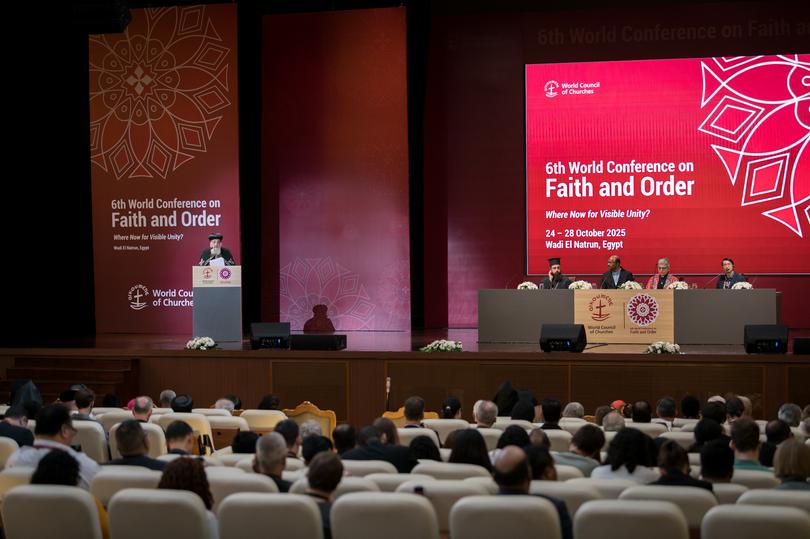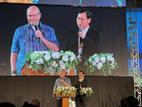The Sixth World Conference on Faith and Order, a gathering of global Christian leaders organized by the World Council of Churches (WCC), officially opened on October 24 at the Logos Papal Center near Egypt's ancient St Bishoy Monastery.
Marking the 1,700th anniversary of the First Ecumenical Council of Nicaea (325 AD), the conference brought together around 400 delegates from diverse Christian traditions under the theme "Where Now for Visible Unity?" – a question framing urgent dialogue on faith, mission, and solidarity amid global crises.
Hosted by Egypt's Coptic Orthodox Church, the opening ceremony unfolded in Wadi El Natrun, a site sacred to Christian monasticism since the fourth century. His Holiness Pope Tawadros II, Pope of Alexandria and patriarch of the See of St Mark, welcomed delegates to "this holy place" and emphasized its connection to ancient and modern unity efforts.
He traced the legacy of the Council of Nicaea, which condemned Arian heresy, established the Nicene Creed, and set a precedent for ecumenical dialogue. "The Ecumenical Council of Nicaea was not merely a theological event; it was a historical moment that established the identity of the universal Church," Pope Tawadros II said.
Recalling Christ's prayer in John 17:21, "That they all may be one", he stressed that true unity is "unity in faith, whose tangible reality is full communion in the divine mysteries." He invited delegates to embrace dialogue not as "a concession of faith, but a testimony to the truth in the spirit of love," urging them to honor Egypt's role as a "bridge among Churches" and a witness to peaceful coexistence.
Rev. Prof. Dr Jerry Pillay, general secretary of the WCC, celebrated the conference as the first Faith and Order World Conference ever held on the African continent. He thanked the Coptic Orthodox Church, along with Egypt's Greek Orthodox Patriarchate of Alexandria, Anglican Diocese of Alexandria, and Synod of the Nile, for their hospitality – and noted the spiritual weight of gathering in Wadi El Natrun, "the birthplace of monasticism."
Against a backdrop of global crises – poverty, ecological collapse, war, and racism – Pillay framed the conference's theme as a call to action. "Now more than ever, it is important to ask what unites us as churches and Christians, but also as humanity as a whole," he said.
Drawing parallels to the Council of Nicaea's mission to "heal the wounds of the world," he outlined three pillars guiding the conference: reaffirming faith in Jesus Christ, reimagining mission free from colonial legacies, and advancing visible unity as a foundation for justice.
He also welcomed the participants of the Global Ecumenical Theological Institute (GETI), calling their presence a testament to the conference's "intergenerational learning" focus.
Rev. Prof. Dr Stephanie Dietrich, moderator of the WCC's Faith and Order Commission, noted the historic gap since the last Faith and Order World Conference – 32 years, since Santiago de Compostela in 1993. She described the 2025 gathering as a "once-in-a-lifetime occasion" tied to Nicaea's legacy of guarding the faith and uniting the Church.
Dietrich highlighted the conference's focus on "shared listening" – through plenaries, workshops, and daily common worship – as a way to honor the Early Church's tradition of dialogue. "This encounter is not only an exchange of theological thought," she said. "It is a school of mutual listening, a testing of our faith beside the faith of others, and a shared obedience to the prayer of our Lord Jesus Christ — that they all may be one."
Rev. Prof. Dr Sandra Beardsall, convener of the Nicaea2025 Steering Group, offered insight into the conference's six-year journey, which began at a 2019 Faith and Order Commission meeting in Nanjing, China. What started as a small group exploring a Nicaea anniversary gathering evolved into a global initiative – one that includes not just the conference, but a year-long commemoration themed "Living the Apostolic Faith Together Today."
Beardsall outlined the conference's structure: three theme days focusing on apostolic faith (October 25), mission (October 27), and visible unity (October 28). She emphasized the gathering's participatory design, with delegates assigned to sections "carefully populated... make sure we hear the range of voices" – a choice rooted in the African proverb: "If we want to go fast, we go alone; if we want to go far, we go together."
Other speakers also included Bishop Elect Dr. Damaskinos Al-Azrai, Greek Orthodox Patriarchate of Alexandria and All Africa, Dr Samy Fawzy Shehata, Primate of the Episcopal/Anglian Province of Alexandria, and Rev. Dr. Refat Fathy, general secretary Synod of the Nile, Evangelical Presbyterian Church of Egypt.
The Sixth World Conference on Faith and Order lasts from October 24 to 28, consisting of thematic plenaries, different sections and workshops, a pilgrimage to Coptic monasteries, a Sunday confession worship, and daily morning and evening prayer services, etc.
According to the World Council of Churches Communication, the participants include 100 church delegates, 60 advisors, and 100 participants of the Global Ecumenical Theological Institute 2025. A regional meeting will be held on October 25, in which delegates from different continents will attend. There are approximately more than 160 from Europe, 40 from Africa, 60 from Asia, 45 from North America, 15 from Latin America, and less than 10 from the Caribbean and the Pacific, respectively.












